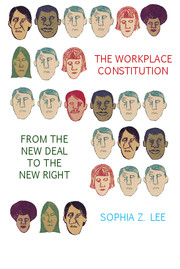Book contents
- Frontmatter
- Contents
- Acknowledgments
- Introduction
- Part I Crafting the Workplace Constitution in the New Deal 1930s and 1940s
- Part II Advancing the Workplace Constitution in the Cold War 1950s
- Part III Administering the Liberal Workplace Constitution in the Long 1960s
- Part IV The Workplace Constitution in the New Right 1970s and 1980s
- Epilogue
- Appendix: Figures
- Notes
- Selected Bibliography of Primary Sources
- Index
Introduction
Published online by Cambridge University Press: 05 October 2014
- Frontmatter
- Contents
- Acknowledgments
- Introduction
- Part I Crafting the Workplace Constitution in the New Deal 1930s and 1940s
- Part II Advancing the Workplace Constitution in the Cold War 1950s
- Part III Administering the Liberal Workplace Constitution in the Long 1960s
- Part IV The Workplace Constitution in the New Right 1970s and 1980s
- Epilogue
- Appendix: Figures
- Notes
- Selected Bibliography of Primary Sources
- Index
Summary
C. W. Rice did not know it, but he set the stage for a fifty-year struggle that has left Americans today with little or no constitutional protections in the workplace. Born in rural Tennessee at the close of the nineteenth century, Rice settled in Houston in the 1920s. There, he established the Texas Negro Business and Laboring Men’s Association, a labor brokerage that placed black workers in industrial jobs. Like most African Americans in the early twentieth century, Rice was harshly critical of the American Federation of Labor (AFL). The AFL’s member unions generally organized workers in a single craft, such as carpenters or machinists. These unions protected jobs and wages by limiting who could join their locals or work alongside their members. This restrictiveness built solidarity and shored up the members’ economic power. It also hurt African Americans because most unions limited membership to “white candidate[s].” These rules and employers’ long-standing hiring practices left African Americans “only those jobs ... [with] low wages, disagreeable dust, and ... tasks regarded as too heavy for native-born white Americans.” Black leaders of Rice’s generation favored thrift, hard work, and self-help to redress this economic hardship. Rice also favored black independent unions (those not affiliated with the AFL). He promoted them in his paper, the Negro Labor News, and organized workers at Houston’s Hughes Tool Company. To many, Rice was a champion of black solidarity and economic advancement who was prolabor yet courageously critical of discriminatory unions.
Rice’s opponents, however, thought he helped employers exploit workers and served as a tool in their antiunion campaigns. Employers had resisted unionization since the nineteenth century. They preferred open shops, in which they could hire whomever they wanted and refuse to bargain with unions. They claimed that unions interfered with management, inflated wages, and were inconsistent with American ideals of individualism and free contract. When Rice built ties with white industrialists, promoted open shops, and encouraged African Americans to take jobs even when they would replace striking white workers, he seemed to side with employers and against organized labor. To his critics, Rice’s all-black independent unions were just company unions: formed with the employer’s blessing, they did not make tough demands and kept out unions that would. In the 1920s, the AFL criticized Rice while civil rights leaders and black Houstonians generally sided with him.
- Type
- Chapter
- Information
- Publisher: Cambridge University PressPrint publication year: 2014



